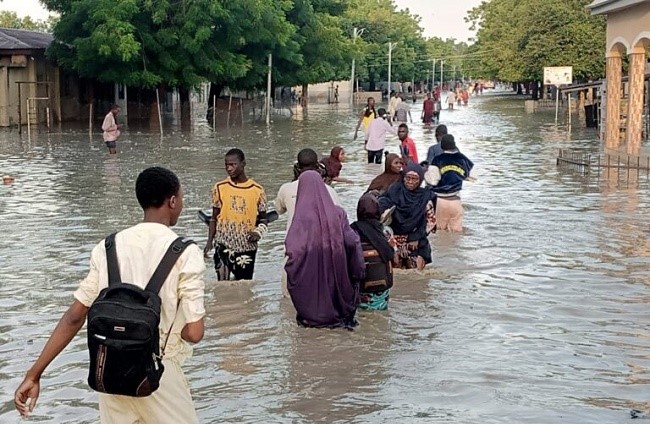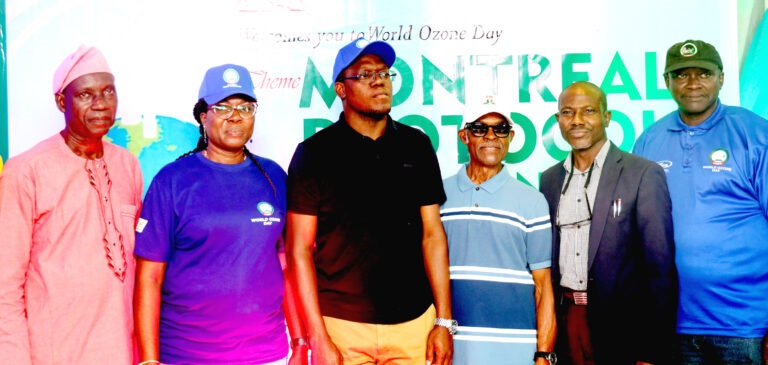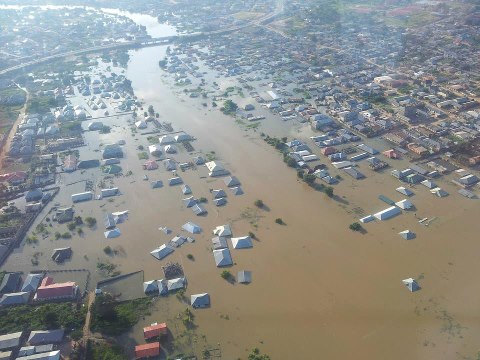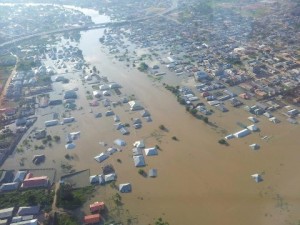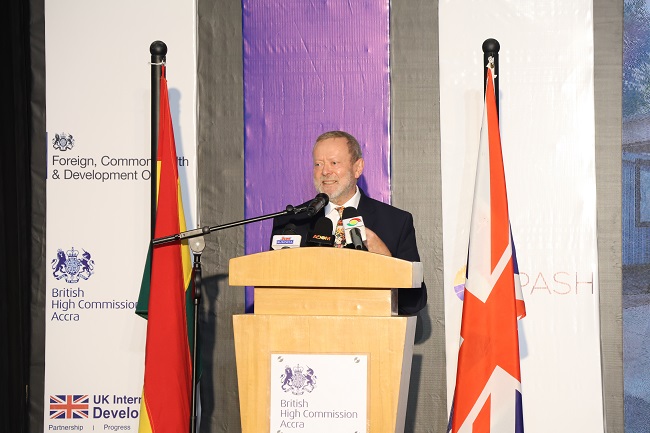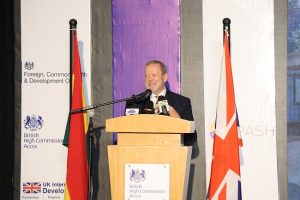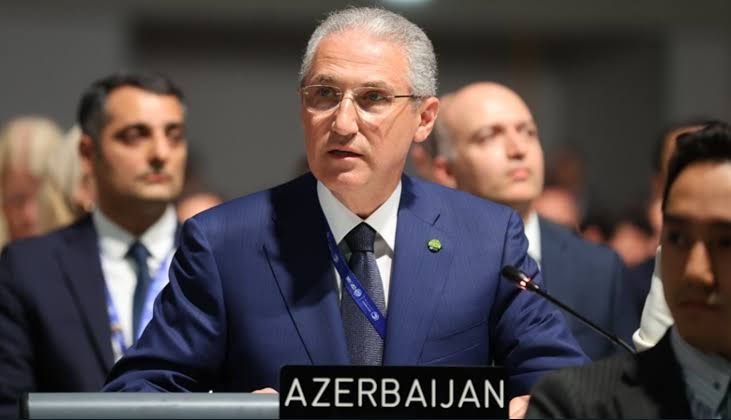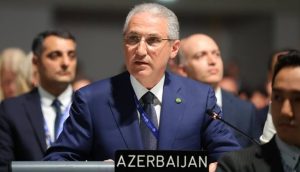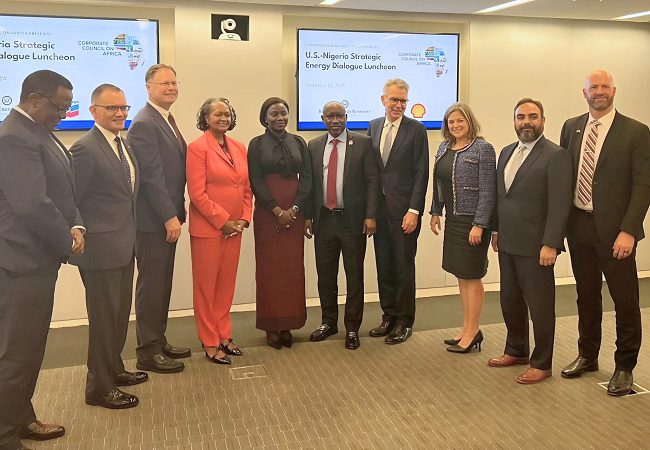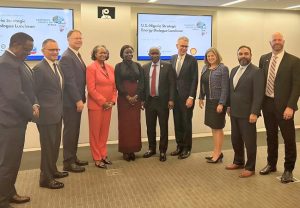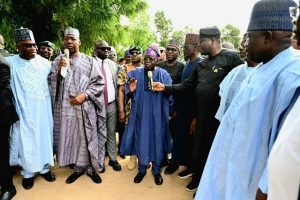The people of Southern Borno Senatorial District have donated N200m to the Borno State Government as part of their contributions to victims of the Maiduguri flood disaster.
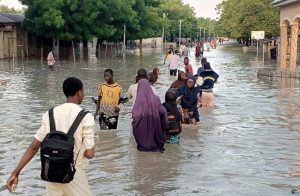
The donation was presented by representatives of the zone comprising nine Local Government Areas led by Sen. Ali Ndume and Deputy Governor of Borno, Alhaji Umar Kadafur.
Speaking during the sympathy visit to Gov. Babagana Zulum, Sen. Ndume said the development was in response to the call by the governor for help from all quarters for victims of the flood that ravaged Maiduguri town.
Ndume said the money was generated from contributions of people from the zone at home and in the diaspora.
The Deputy Governor of Borno, Alhaji Umar Kadafur, who handed over the cheque to Gov. Zulum, lauded all those who contributed for their generosity and act of brotherhood.
“We are here not only to sympathise with you but to present a cheque of N200 million to the State Government Flood Basket Fund.
“We want to assure you that you are not alone as the people of Southern Borno are strongly behind you in this trying moment.
“More donations from southern Borno are still being expected,” Kadafur said.
Responding, Gov. Zulum expressed appreciation for the gesture and show of concern from the people of southern Borno.
The governor urged for sustained unity among the diverse people of the state for meaningful development.
The delegation also visited the Shehu of Borno, Alhaji Abubakar Umar-Garbai El-Kanemi, whose palace was affected, where it presented N10 million support to the royal father.
Members of Borno House of Assembly also paid sympathy visit to Gov. Zulum where they donated the sum of N60 million.
A group, The Northern Christian Youth Professionals (NCYP), has called for the probe of the recent breakdown of Alau Dam that resulted in the devastating food disaster in Maiduguri.
It urged the Federal and Borno State Governments to investigate and hold accountable those responsible for the dam’s alleged mishandling that led to the loss of lives and property following the disaster.
The demand was contained in a press statement signed by Mr Isaac Abrak, Chairman of the group, issued on Tuesday, Septemner 17, 2024, in Kaduna.
The group claimed that the Commonwealth had provided funds for the dam’s maintenance and climate change initiatives.
Abrak said, “We demand for a probe and accountability of ecological funding.
“The recent flood in Borno caused by the breakdown of the Alau Dam has resulted in unprecedented devastation.
“Over 30 lives lost, 23,000 residential houses destroyed and 414,000 people displaced.
“Critical infrastructure, including bridges, roads, electricity systems, healthcare facilities, and schools, had been severely damaged.
“Approximately one million people have lost their sources of livelihood.”
According to him, the group commends President Bola Tinubu’s compassionate visit and N3 billion pledge, adding, “we seek the investigation of the existing N40 billion ecological funds.
“With Borno receiving N800 million, the funds have failed to mitigate climate issues.
“Flooding is an existential problem worsened by leadership failures. Throwing money at environmental problems without accountability is inhumane.”
He said that the group was calling for the transparent utilisation of the existing funds and the construction of safe houses in highland areas.
“Others include the provision of logistics support for temporary relocation and alternative education arrangements for pupils and students.”
Meanwhile, the Nigerian Academy of Science has said that both natural and human factors contributed to the flood incidents and resulting disaster experienced in Adamawa, Borno, Jigawa and Taraba states between August and September 2024.
“We recognise the role of river overflow in the Jigawa and Borno episodes, possibly as part of the effects of global climate change, as well as the exacerbation of the latter episode by the failure of the Alau Dam constructed on the channel of the River Ngadda some 20km south of Maiduguri,” said the Academy, adding that it is part of its mandate to assist government and stakeholders in addressing national problems that can be solved by the application of science, technology and innovation.
The group pointed out that, to reduce frequencies of flood disasters in the nation, conscious effort must be made to:
- commission environmental vulnerability mapping of potential disaster hotspots across the nation;
- commit to rigorous environmental impact assessment of large-scale infrastructure with potential disaster consequences; and
- construct and routinely simulate and operate contingency plans to rapidly respond to specific disaster
“In all the above tasks, the Nigerian Academy of Science stands ready to provide expert advice,” it concluded.

